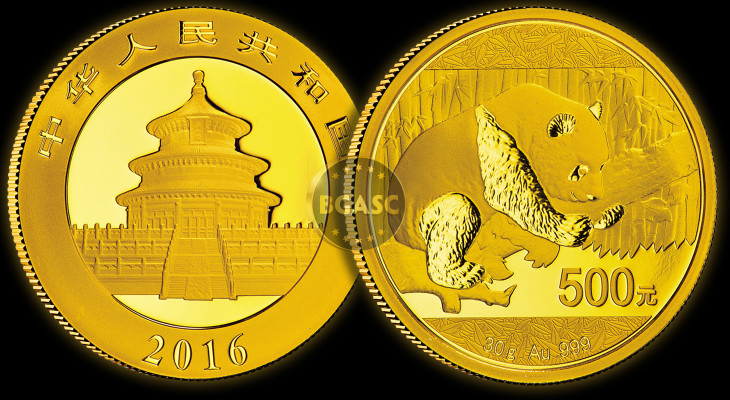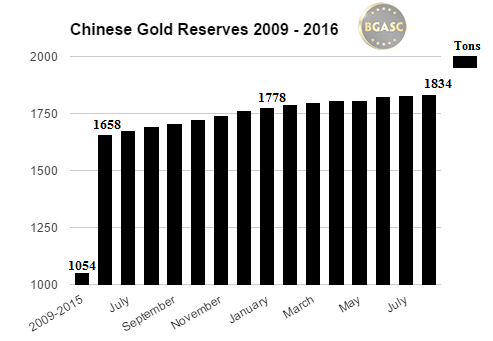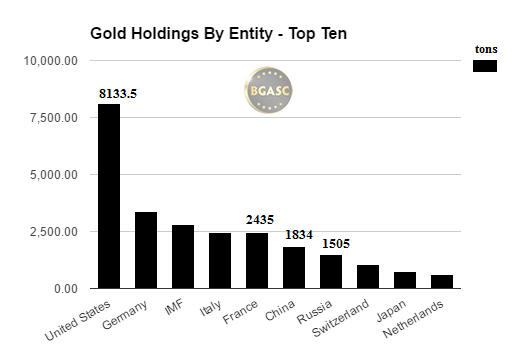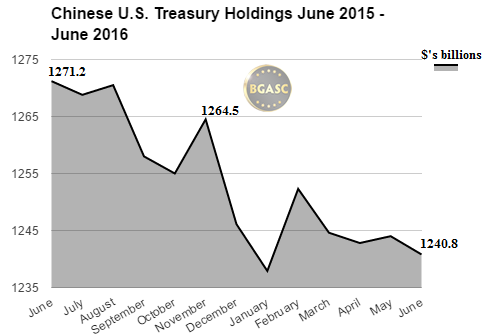
China Continues To Add Gold To Reserves Even as Her Overall Reserves Fall
Chinese Central Bank Reports 1,834 Tons of Gold as Reserves in August
Chinese Gold Reserves
In August 2016, the People’s Bank of China (PBOC) added 5 tons of gold to its reserves. Since starting monthly gold reporting in July 2015, China has added about 175 tons of gold to its reserves, bringing its total to the fifth most of any nation. The Chinese Central Bank, however, has slowed its gold acquisition in recent months. From May to August the People’s Bank of China added twenty-five tons of gold or an average of less than seven tons a month. From January to April the PBOC added 46 tons of gold or an average of over 11 tons per month.

The People’s Bank of China now has nearly 1,834 tons of gold as reserves. While this gold hoard places China in fifth place among gold holding nations, it only represents 2.2% of China’s overall reserves. As the price of gold rises and China sells off some of its U.S. Treasury securities, however, the percentage of China’s gold as a percentage of her overall reserves increases.
Price Sensitivity?
The reduced pace of gold acquisitions at the PBOC mirrors the reduction in volume of gold delivered and withdrawn from the Shanghai Gold Exchange in recent months. Year to data gold withdrawals on the Shanghai Gold Exchange are down about 29% year over year and down about 46% in August year over year. Western gold demand in the form of gold futures contracts and gold ETFs have pushed gold higher in 2016, while curbing Chinese physical gold demand. Higher gold prices attract western buyers who purchase gold in the form of financial instruments, while higher prices tend to slow physical buyers of gold jewelry and physical gold investment products like coins and bars.
Despite their slowing gold purchases, the PBOC remains along with the Central Bank of Russia, the largest buyers of gold among central banks. The central banks of Russia and China accounted for nearly 85% of all central bank gold purchases in 2015. Gold represents about 2.2% of China’s over all foreign reserves and about 15% of Russia’s.

China’s Foreign Reserves Stabilizing
After months of declining foreign reserves, China’s foreign reserves grew in March from $3.20 trillion to $3.21 trillion. China’s foreign reserves rose again from $3.21 trillion in March to $3.22 trillion in April. In May, China’s reserves fell to $3.19 trillion and rose to $3.21 trillion in June. China’s reserves fell to $3.20 trillion in July.China’s foreign reserves fell again in August to $3.19 trillion, even though gold reserves increased.
China’s slowing growth over the past year has caused concern in the global markets that China’s growth phase may come to a crashing halt – and with it the global economy. Since China is a voracious consumer of imported resources to fuel its growth, a decline in China’s growth harms commodity producing countries as demand slows. The increase/stabilization of China’s reserves has been seen as a sign that China’s growth is stabilizing.
During the period of declining overall reserves last year and earlier this year, China continued to add gold to its reserves. In March and April when her overall reserves increased, China also added more gold to its reserves. The People’s Bank of China, however, added no gold to reserves in May. China resumed gold purchases in June by adding 15 tons of gold to reserves. China’s gold purchases slowed in July and August to about five tons.
China’s imports and exports fell in July raising concerns again of slowing Chinese and global economic growth. Chinese imports fell over 12% indicating cooling domestic demand and exports fell about 4.5% indicating declining global demand for Chinese products.
Chinese U.S. Treasury Bond Holdings
As of June, 2016, China held $1.240 trillion in U.S. Treasury Bonds, making Chinas the largest foreign holder of U.S. Treasury securities, ahead of Japan’s $1.148 trillion holdings. China has sold off a portion of its Treasury bonds over the past year, but still holds more than any other nation. China accumulated its U.S. Treasuries in large part as a result of its exports to the United States for which it received dollars and in turn converted them into U.S. Treasury Bonds.

This article by BGASC is not, and should not be regarded as, investment advice or as a recommendation regarding any particular course of action.
